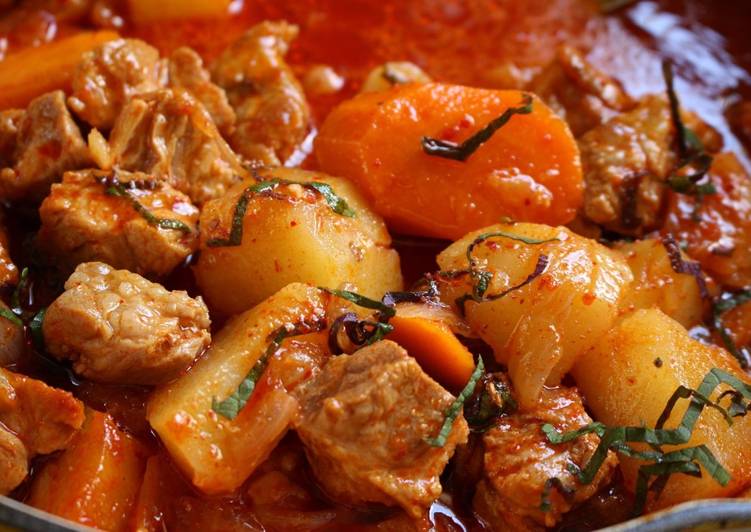Gamja Tang (Hot & Spicy Korean Potato & Pork Stew). Gamja Tang (Hot & Spicy Korean Potato & Pork Stew) Shinae Southern California, USA Gamja tang (pronounced GAHMjah TAHNG, gamja = potato, tang = stew/soup) is a thick, hearty, spicy Korean stoup usually ma. more Gamjatang is a spicy Korean pork bone soup. It is made by simmering pork bones for a long time then the strained milky bone broth is seasoned with Korean special condiments such as gochugaru (Korean chili flakes) and gochujang (Korean chili paste). The soup is very hearty and comforting so it's perfect for cold wintry weather.
 It's mainly made of pork bones, potatoes, napa cabbages, perilla leaves, perilla seeds, bean sprouts, green onions, doenjang (Korean fermented bean paste), and gochujang (Korean hot pepper paste).
Gamja Tang (Hot & Spicy Korean Potato & Pork Stew) instructions.
Place all ingredients except potatoes and carrots into a large pot, cover, and bring to a gentle boil for about two minutes over medium high heat.
You can cook Gamja Tang (Hot & Spicy Korean Potato & Pork Stew) using 13 ingredients and 6 steps. Here is how you cook that.
It's mainly made of pork bones, potatoes, napa cabbages, perilla leaves, perilla seeds, bean sprouts, green onions, doenjang (Korean fermented bean paste), and gochujang (Korean hot pepper paste).
Gamja Tang (Hot & Spicy Korean Potato & Pork Stew) instructions.
Place all ingredients except potatoes and carrots into a large pot, cover, and bring to a gentle boil for about two minutes over medium high heat.
You can cook Gamja Tang (Hot & Spicy Korean Potato & Pork Stew) using 13 ingredients and 6 steps. Here is how you cook that.
Ingredients of Gamja Tang (Hot & Spicy Korean Potato & Pork Stew)
- Prepare 1.5 pounds of boneless pork shoulder, cut into 1-inch cubes.
- It's 4 cups of water and/or unsalted stock (I used half water, half unsalted chicken stock.).
- Prepare 1/2 of medium onion, sliced into 1/4-inch slices.
- You need 5 cloves of garlic, peeled and smashed.
- You need 2 Tablespoons of gochujang (Korean red chili paste) You can substitute with 2 to 3 teaspoons cayenne + 1 Tablespoon paprika (unsmoked) + plus 1 Tablespoon soy sauce.
- It's 2 Tablespoons of gochugaru (Korean red chili flakes) You can substitute with 1/2 to 1 Tablespoon red chili flakes (like the kind you use for your pizza/pasta).
- Prepare 1 Tablespoon of soy sauce or fish sauce.
- You need 1/2 teaspoon of sugar.
- You need 1.5 pounds of Russet potatoes, peeled and cut into roughly 1-inch pieces (that's about 3 medium or 4 small ones).
- You need 2 of medium carrots, cut into 1/3-inch thick slices on the bias.
- Prepare of optional: julienned fresh perilla leaves for garnish.
- Prepare of salt to adjust seasoning if needed.
- You need of optional: chopped green onion for garnish.
When the stew comes to a boil, give everything a good stir to evenly distribute and incorporate all the ingredients. Gamjatang is soup made with pork neck bones and vegetables. Sizzling hot gamjatang is hearty and savory which makes it always popular at the dinner table. The soft fatty meat picked from the gaps between the bones is especially tasty.
Gamja Tang (Hot & Spicy Korean Potato & Pork Stew) instructions
- Place all ingredients except potatoes and carrots into a large pot, cover, and bring to a gentle boil for about two minutes over medium high heat. When the stew comes to a boil, give everything a good stir to evenly distribute and incorporate all the ingredients..
- Turn the heat down to medium low, cover again, and simmer for 20 minutes..
- Add the potatoes and carrots, cover again, and simmer for another 20 minutes..
- Give the stew another stir or two, put the lid back on askew, and continue to simmer for another 10 to 15 minutes over medium low heat. Give it a taste and adjust the salt level with salt if necessary, and that's it!.
- Serve in individual bowls or family style (as is typical for most casual Korean family meals), sprinkle with perilla and/or green onion, and enjoy with a bowl of steamed rice. If you want to save yourself some dishes, you can combine the stew and rice in one bowl, which is a totally Korean thing to do..
- Enjoy!.
The fully cooked cabbage and bean sprouts in the stock turn soft yet retain a crispy texture. Gamjatang (감자탕) is a spicy, hearty stew made with pork bones. Gamja (감자) is a Korean word that's more commonly used for potato, but for this dish, gamja actually refers to a part of the pork spine. Honestly, I didn't even know this until I started researching the origin of gamjatang for this post. Gamja means potato, and this soup includes lots of potatoes in the soup.